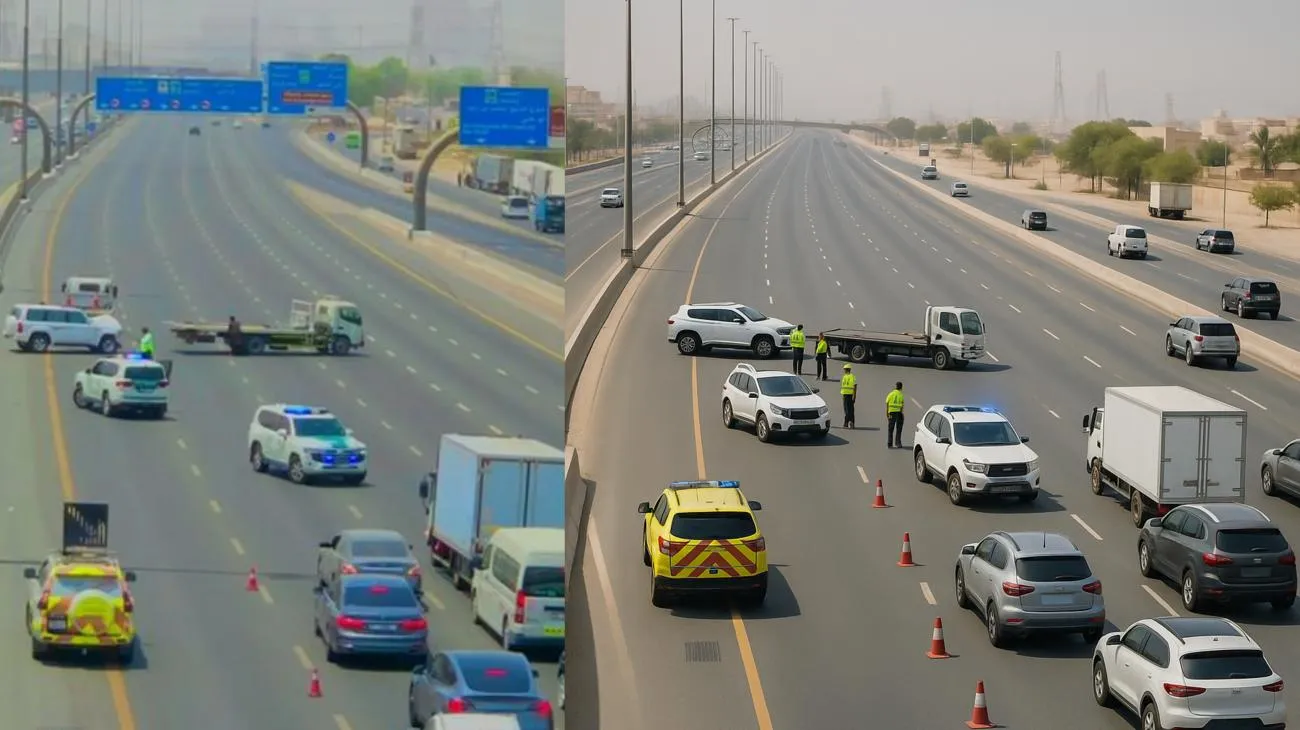Dubai police continue making international headlines, but not through flashy supercars or cutting-edge technology – instead, through remarkable traffic control authority that commands instant compliance across multi-lane highways. This viral demonstration of Dubai law enforcement effectiveness has captured global attention, showcasing how systematic governance creates order that seems almost effortless to international observers.
Content creator S.K. Gawri’s recent TikTok video perfectly illustrates what locals call the “Power of Dubai Police,” showing a bustling highway transformed into organized compliance within moments. With over 13 million views, this footage sparked worldwide conversations about traffic management systems and law enforcement capabilities, revealing stark differences in governmental effectiveness across nations.
Dubai Police Traffic Control Demonstrates Unprecedented Highway Authority
The viral footage captures something extraordinary to international viewers yet routine for Dubai residents: a single police vehicle with flashing lights positioned strategically on a busy highway, surrounded by traffic cones marking a controlled area. What amazes global audiences isn’t the basic setup – it’s the immediate, universal compliance from every single driver without exception.
No aggressive honking disrupts the scene, no vehicles attempt squeezing around barriers, and none of the typical chaos associated with traffic disruptions emerges. Instead, viewers witness what happens when law enforcement operates within systems where traffic rules aren’t mere suggestions and authority respect isn’t negotiable.
Traffic Management Science Behind Dubai’s Enforcement Success
Dubai’s traffic control operates on “predictable enforcement” principles, where consistent application of traffic laws creates behavioral predictability. Dubai Police statistics reveal the emirate maintains among the world’s lowest traffic violation rates per capita, largely attributed to systematic rule application and substantial financial penalties making violations economically irrational.
The Dubai Roads and Transport Authority processes over 2.5 million vehicles daily across the emirate’s extensive road network. This massive logistical achievement depends heavily on drivers understanding that traffic violations carry serious consequences – including substantial fines and potential visa complications for expatriate residents who comprise over 85% of Dubai’s population.
International Reactions Expose Law Enforcement Effectiveness Gaps
The video’s comment section became an unexpected showcase of national pride, with viewers from Saudi Arabia, Qatar, Kenya, and India defending their countries’ police capabilities. Comments ranged from “Saudi Arabia police also same” to “come to Kenya,” revealing how this simple traffic scene highlighted sensitive comparisons about governmental effectiveness worldwide.
@s_k_gawri #power #of #dubai #🇦🇪 🇦🇪 #police #placetiktokteamunfrrezmyacvount #100millionviews #dubaiPolice👮♂️
One particularly insightful observation emerged: “is not the power of police brother, power of law.” This comment identifies the core element making Dubai’s system function – success stems not from individual officers wielding authority, but from legal frameworks everyone understands and respects consistently.
Compliance Versus Fear: The Underlying Traffic Control Dynamics
Critics didn’t hesitate highlighting uncomfortable truths about Dubai’s traffic success. Comments like “What power? its fear of deportation” and “Power of fines and fear of fine in peoples” expose crucial aspects supporters prefer avoiding discussion.
For Dubai’s massive expatriate population, traffic violations can escalate into visa complications, transforming compliance from civic responsibility into residency security necessity. This reality creates powerful behavioral incentives extending far beyond typical traffic law enforcement.
Why Dubai Traffic Videos Achieve Global Viral Status
This seemingly mundane highway scene’s viral success reflects worldwide fascination with functional governance systems. In an era dominated by traffic chaos, road rage incidents, and ineffective law enforcement headlines globally, Dubai’s orderly traffic control represents aspirational governance many societies hope to achieve.
The video’s 16,000+ shares indicate viewers aren’t passively consuming content – they’re actively spreading examples of systematic order throughout their networks, possibly hoping local authorities might adopt similar approaches. This organic distribution demonstrates genuine appetite for effective traffic management solutions.
Dubai’s Traffic Control Reveals Broader Governance Philosophy
Beyond impressive traffic coordination, this viral moment captures Dubai’s comprehensive governmental approach: visible efficiency, predictable consequences, and systems designed for smooth functionality rather than dramatic intervention. It represents governance as performance art, where routine police operations become demonstrations of state capability.
While debates continue whether this represents genuine law respect or calculated compliance based on consequences, measurable results speak definitively. Dubai maintains some of the world’s safest, most efficiently managed roads, and videos like S.K. Gawri’s continue showcasing this reality to millions of fascinated international viewers, proving that sometimes the most powerful demonstrations involve showing systems working so seamlessly they appear effortless.
Table of Contents

